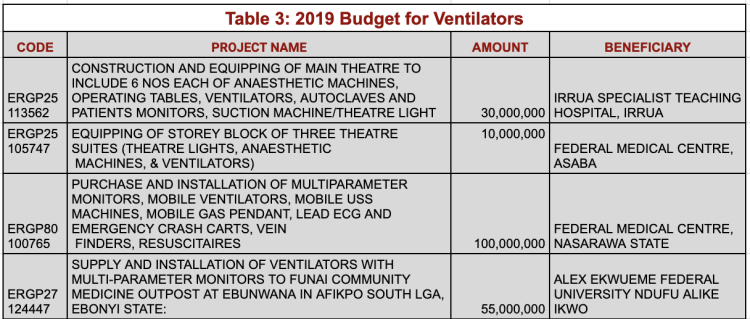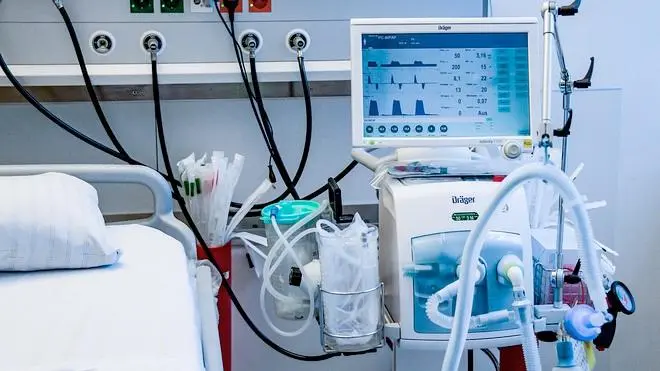As the number of confirmed cases of COVID-19 rise to 210 in Nigeria, an analysis by DATAPHYTE has shown that the Federal Government only purchased six ventilators worth the sum of N77.6 million in 2019. According to the daily payment report for 2019, these six ventilators are supposedly meant to fill the gap for ventilators by 200 million Nigerian.
The paltry spending on essential medical equipment represents total disregard for critical health challenges of citizens and the total absence of disease surveillance capabilities on the part of the government. For instance, a recent report showed that there are only 169 ventilators in the country.
Clearly, this number is not even enough for the remaining 181 confirmed persons if they all require one today. What the Nigeria government is saying in a public health emergency such as the COVID-19 pandemic, is that about 1.18million Nigerians should cling to one ventilator.
As shown in Table 1 below, payments were made to supply ventilators to the Federal Medical Centres in Asaba, Delta State and Azare, Bauchi State as well as the National Orthopaedic Hospital, Enugu, Enugu State.

To further show the total lack of preparedness for a health emergency, the 2020 Health Budget for projects involving procuring ventilators is a meagre N146.6million. This would only pay for 10 to 11 ventilators assuming the whole funds was to buy ventilators. As shown in Table 2 below, just three additional medical centres were selected to have ventilators in 2020. You will recall the fourth on the list, Federal Medical Centre, Asaba is an ongoing project which has been sorted in the 2019 payment.

Actually, the budgets from 2018 to 2020 show the federal government budgeted for six (6) medical centres in 6 states within four geo-political zones of the country. These centres as shown in tables 2 to 4 are Ebonyi (South-east), Lagos (South-west), Edo and Delta (South-south), Nasarawa and FCT (North-central). This left out two regions – the North-east and North-west and as a matter of fact 31 states.

If the position that Nigeria needs 10,000 Ventilators is anything to go with, then the country has a deficit of 9,831 ventilators. With the foregoing budget trend, it could mean the country will take 983 years to provide for its ventilator needs, given, the country purchases an average of 10 ventilators annually. The three-year trend of paltry spending on essential medical equipment clearly justifies the position of public health advocates that the Nigerian government do not understand how dire the healthcare needs of the country is.

Pharm. Remi Adeseun, a public health advocate believes the Nigerian government at both Federal and State levels does not take the health of its citizens serious which explains why the government’s budget so low despite ceaseless advocacy. There is hardly any WHO health indicator which Nigeria measures up to par, which is a representation of the poor financing of the health sector, he said. He further expressed worry about the claim that no confirmed case needs a ventilator yet, saying it might just be the smart excuse for the lack of ventilators.
Government Ignores Demand to Prioritise Health Financing
Stakeholders in the health sectors have continued to decry the low health financing in the country. A recent report by Dataphyte revealed that Nigerian legislators only budgeted, 2.8 percent (i.e 2.8 billion) for healthcare out of the 100 billion earmarked for zonal intervention projects in 2020.
Likewise, the Federal Government in its 2020 budget allocations, appropriated N427.3 billion for health. Inadvertently saying two thousand naira (N2,000) would be enough in the year 2020 to provide for the healthcare of each of the estimated 200 million Nigerians.
Dr Ifeanyi Nsofor speaking at Dataphyte Webinar Series holds the opinion that the state governments, as well as local governments, need to rise up to the occasion on the issue of health financing. He argued that primary healthcare is a local government mandate, thus local government executives should optimize their allocations and revenues to support the effort of the Federal government.
Editor’s Note: The title of this story was changed to reflect the statistical representation of the content






